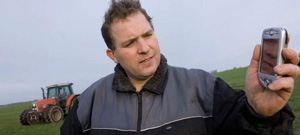The farmer's virtual desk

It is a long way from rural countryside idyll to modern farming. Today, a holding is a high-tech workplace with information and communication technology in the pig stable, in the tractors - and in the farmer's computer in the office. The farmer communicates electronically with his agricultural advisor, with the national agricultural advisory service and with his business collaborators - for instance the people who purchase his crops.
But the gathering and distribution of knowledge could be even more efficient within farming - because at the moment, there are far too many proprietory systems that are unable to communicate with each other. In addition, the fact that the farmer is "mobile" all the time and is seldom sitting at his computer is a further challenge.
The national centre of the Danish Agricultural Advisory Service wants to remedy this, so with support from the Danish National Advanced Technology Foundation, they have initiated the project "The Virtual Desks." CISS participates in this project alongside ISIS Katrinebjerg, the University of Southern Denmark and the advanced-technology network KomIalt.
The desk is mobile
"In this connection, we have hired a PhD student, Kim Christensen, whose job will be to look at how the different types of embedded software may be enabled to communicate with each other to a larger degree. It's a huge project, because it requires a change of the fundamental software architecture in every single module," vice director of CISS, associate professor Arne Skou explains.
The information also needs to be made available to the farmer wherever he needs them - and on whatever medium it is easiest for him to work with. Head of department Peter Enevoldsen, Danish Agricultural Advisory Service's national centre, dreams that the farmer's virtual desk will be there for him whenever he needs it.
"Imagine that the farmer is standing in his wheat field. By GPS, the 'system' is aware that this is where he's situated. This means that even though in principle he needs to have access to all the information, it will presumably first and foremost be information about the wheat field that he wants. Therefore, it would be an advantage for him to be able to pull information about for instance future insect pests - and maybe get some advice about protection from his advisory service centre," Peter Enevoldsen explains.
Decision support
Modern farming already makes use of climate control systems, weather stations, warning services and so on. The national centre has a dream that they will be able to develop these systems and make them more active, so that they can function as decision support for the farmer. Therefore, Peter Enevoldsen is very happy to have CISS along on the project.
"Part of what 'our' PhD student at CISS will be looking at is workflow, that is, how the farmer can get access to the information he needs about the holding's work procedures in the exact place he needs it. In this connection, it is a clear advantage to have a centre such as CISS along, because we can draw upon the broad knowledge and high level of competence that the centre possesses," points out Peter Enevoldsen, who sees it as a great benefit that CISS is already familiar with the area - among other things through the climate control project carried through in collaboration with the company Skov A/S.
Scientific supervisor for Ph D student Kim Christensen is associate professor Lone Leth, the Department of Computer Science. The project was initated in October 2006 and will run over a period of three years.
|

